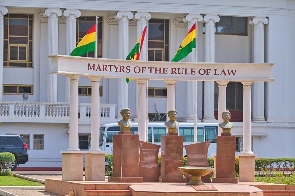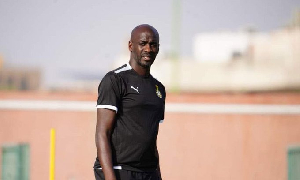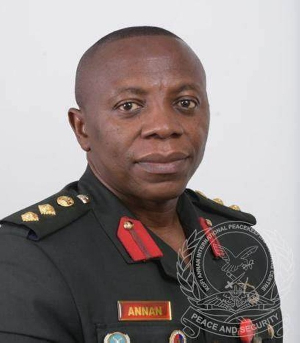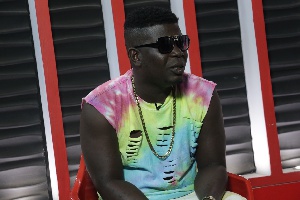The Supreme Court, has dismissed a motion by former President John Dramani Mahama, seeking permission to elicit answers to some 12 interrogatories from the Electoral Commission.
The ruling is said to be a departure from a precedent set by the same Court, when it heard the 2013 election petition filed by then candidate, Nana Akufo-Addo, Dr. Mahamudu Bawumia and the late Jake Obetsebi-Lamptey.
In that instance, the demand by the petitioners' lawyers was granted.
The seven-member panel of Judges hearing the petition, includes the Chief Justice Anin-Yeboah, Justices Yaw Appau, Marful Sau, Professor Ashie Kotei, Mariama Owusu, Nene Amegatcher, and Gertrude Tokonor.
Aside the Chief Justice, the other Justices are all hearing the election petition for the first time.
They had departed from the earlier decision of the nine-member Supreme Court panel led by Justice William Atuguba, supported by Sophia Adinyira, Jones Victor M. Dotse, Paul Baffoe-Bonnie, N. S.Gbadegbe, Vida Akoto-Bamfo, Julius Ansah, Rose Constance Owusu, and Anin Yeboah.
What is interesting is that in the 2013 case, the then Chief Justice, did not sit on the case thus had an independent and critical view of the operations of the panel, but Justice Anin Yeboah, the present Chief Justice is on the current bench.
Among others, lawyers for the petitioner led by Tsatsu Tsikata, wanted the EC to answer if the National Communications Authority (NCA) played any role or facilitated in any way, the transmission of the election results to its headquarters.
Again, Mr Mahama wants to know how the Chairperson of the EC, Jean Mensa, arrived at the figures she used in declaring candidate Nana Akufo-Addo as the winner of the 2020 presidential poll.
Mr Tsikata argued that, the interrogatories are critical as it would help the apex court determine the authenticity of the results that saw the NPP presidential candidate, emerging as the winner of the 2020 polls.
But the EC's lawyer, Justin Amenuvor contends that Mr Tsikata is using the back door to introduce matters that are not stated in their earlier petition.
He explained that most of the questions are not in contention and have either been answered by the EC or is information that John Mahama is well aware of, because he deployed agents across the country.
Giving its verdict on the motion, the Supreme Court held the view that Lawyer Tsatsu was relying on CI 47, while the current rule in force relating to the Supreme Court is the CI 99.
Also, the request requires the exercise of discretionary power that is granted when a case for relevance is made, but since this has not been established, hence the decision to dismiss the motion.
Meanwhile, the legal representation for Mr Mahama, includes Tony Lithur led by Tsatsu Tsikata, while Lawyer Justin Amenuvor and Lawyer A. Asamoah are the lawyers for the Electoral Commission of Ghana who is the 1st Respondent; and Akoto Ampaw with Frank Davies, Kwaku Asirifi, and Yaw Oppong, represent the 2nd Respondent who is President Akufo-Addo.
The National Democratic Congress' (NDC) flagbearer, John Dramani Mahama, has petitioned the Supreme Court to order a second round of the December 7, election.
According to the former President, the votes obtained by New Patriotic Party (NPP) candidate and himself in the December 7, election as declared by the EC Chair, were not enough to be declared winner.
In his petition to the Supreme Court, Mr Mahama said, "The claim that percentage of votes obtained by the 2nd Respondent [Nana Akufo-Addo] was 51.595% [6,730,413] of the total valid votes that she distinctly stated to have been 13,434,574 was a manifest error, as votes cast for 2nd Respondent would amount to 50.098% and not the 51.595% erroneously declared."
He said the 1st Respondent in her December 9 declaration, said the NDC candidate obtained 6,214,889 being 47.366% of the valid votes.
"From the total votes cast of 13,434,574, petitioner's percentages would reduce to 46.260% and not the 47.366% erroneously declared.
"The percentage attribute to all but one of the other candidates by Mrs Jean Adukwei Mensa were all incorrect," he said.
The former President, argued that if all the valid votes for all the candidates who contested the election are put together, it would total "13,121,111, a figure that is completely missing from the purported declaration by Mrs. Jean Adukwei Mensa on December 9, and the purported rectification on December 10."
Mr Mahama, said the percentage of all the valid votes for the 12 contesting candidates "would yield a total of 100.03%."
This he said is a "mathematical and statistical impossibility, a further proof of the wrongfulness and unconstitutionality of the purported declaration."
John Mahama's side has since expressed disquiet over the decision by the Supreme Court to dismiss an application to formally serve questions on the Electoral Commission.
Domonic Ayine, a spokesperson for Mr Mahama in the case, said the court's ruling was shocking and "legally untenable."
Mr Mahama, through his legal team, was seeking to compel the EC to provide answers to some questions known in legal parlance as interrogatories.
He was demanding answers to questions such as how the presidential election results were transmitted and the level of involvement of the National Communications Authority in the transmission process.
Because of changes to C.I. 99, which has put a time limit on the hearing, the court noted that it was mandated to ensure expeditious handling of the petition and questioned the relevance of Mr Mahama's questions to the EC.
But Mr Ayine, feels the court has overruled its own position from the election petition in 2013 "without according reasons as is required by the constitutions and existing practices and precedents."
"We think that the court sidestepped the basic issues that were brought before it. We think that the issues were very relevant because they go to the integrity of the pleadings that were filed."
Following the development, Mr Ayine, said Mr Mahama's team has "requested for the ruling of the court, and we have told the court we will advise ourselves with respect to the ruling."
He maintains that Mr Mahama's lead lawyer, Tsatsu Tsikata, adequately established the relevance of the motion and "was designed for an expeditious trial."
"Our application was basically to elicit answers that will lead to an expeditious determination of the matter, so we don't have to take them to cross-examination and have a lengthy trial."
General News of Thursday, 21 January 2021
Source: theheraldghana.com
Supreme Court departs from its decision in 2013 election petition
Justice delayed is justice denied – Frank Davies counters Tsatsu
0 seconds of 2 minutes, 25 secondsVolume 90%
Press shift question mark to access a list of keyboard shortcuts
Keyboard Shortcuts
Shortcuts Open/Close/ or ?
Play/PauseSPACE
Increase Volume↑
Decrease Volume↓
Seek Forward→
Seek Backward←
Captions On/Offc
Fullscreen/Exit Fullscreenf
Mute/Unmutem
Decrease Caption Size-
Increase Caption Size+ or =
Seek %0-9













